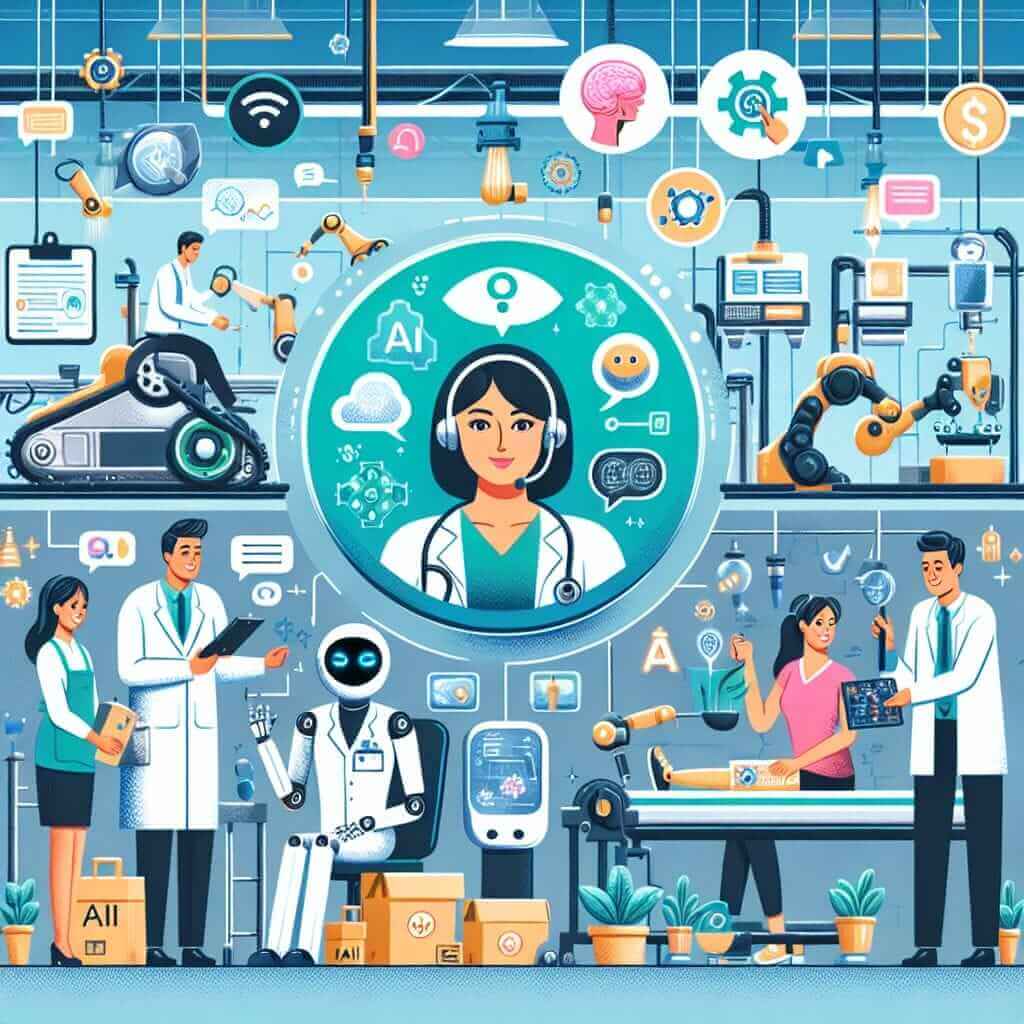The IELTS Reading test demands a variety of skills to comprehend and respond to diverse types of questions. Among the range of topics, the impact of Artificial Intelligence (AI) on the future of work is both critical and recurrent. This article will guide candidates on this theme by offering a comprehensive reading passage, related questions, detailed answers, and useful tips.
Sample Reading Passage and Practice Questions
How is AI transforming the future of work?
Artificial Intelligence (AI) is a revolutionary force reshaping the workplace fundamentally. This transformation encompasses various facets, from automation and job displacement to the creation of new roles and enhancement of human capabilities.
Automation and Efficiency:
AI-driven automation replaces repetitive tasks, which historically required significant human effort. Industries such as manufacturing, logistics, and customer service see an upsurge in productivity due to robotic process automation (RPA) and AI algorithms that effectively manage complex datasets.
Job Displacement and Creation:
The integration of AI induces anxiety concerning job displacement. However, while certain low-skilled jobs may become obsolete, AI also catalyzes the creation of new positions. The demand for AI specialists, data analysts, and cybersecurity experts has soared, emphasizing a shift towards more advanced skill sets.
Enhancing Human Capabilities:
AI enhances human capabilities by augmenting decision-making processes. AI systems analyze vast amounts of information, providing insights that support strategic planning. Additionally, AI-powered tools, like natural language processing (NLP) applications, improve efficiency in fields such as law and medicine.
Ethical and Social Implications:
The ethical implications of AI, such as data privacy and bias, are paramount. Organizations must ensure that AI systems operate transparently and equitably. Furthermore, governments and educational institutions play a crucial role in fostering digital literacy and resilience in the workforce to adapt to AI-driven changes.
Conclusion:
AI’s trajectory in the workplace is inevitable and multifaceted. The collaboration between AI and human endeavors promises a future where work is more innovative, efficient, and inclusive.
Questions:
Multiple Choice:
-
Which industry is MOST likely to see an increase in productivity due to AI?
a. Education
b. Manufacturing
c. Healthcare
d. Entertainment -
What is a significant concern associated with AI integration in the workplace?
a. Increased job opportunities
b. Enhanced productivity
c. Job displacement
d. Better decision-making
Identifying Information (True/False/Not Given):
- AI eliminates the need for human decision-making in strategic planning.
- Governments have a role in ensuring digital literacy in an AI-driven economy.
Matching Information:
-
Match the following aspects with their descriptions:
- Automation and Efficiency
- Job Displacement and Creation
- Enhancing Human Capabilities
- Ethical and Social Implications
a. Concerns such as data privacy and bias.
b. Increased productivity by managing complex datasets.
c. The rise of new roles, such as AI specialists and data analysts.
d. Improvement in strategic decision-making processes.
Answer Key and Explanations:
-
b. Manufacturing
- Explanation: The passage mentions that industries like manufacturing see a productivity boost due to AI and robotic process automation.
-
c. Job displacement
- Explanation: The text states that AI integration causes anxiety about job displacement even though it also creates new jobs.
-
False
- Explanation: The passage says AI supports decision-making, but it does not replace human decision-making entirely.
-
True
- Explanation: The text states that governments and educational institutions are essential in fostering digital literacy for the changing workforce.
-
- Automation and Efficiency – b. Increased productivity by managing complex datasets.
- Job Displacement and Creation – c. The rise of new roles, such as AI specialists and data analysts.
- Enhancing Human Capabilities – d. Improvement in strategic decision-making processes.
- Ethical and Social Implications – a. Concerns such as data privacy and bias.
Common Mistakes:
- Misinterpreting the scope of AI’s impact: Always pay attention to the specific details provided about the impact of AI.
- Overlooking contextual clues: Critical thinking and focus on contextual hints can prevent incorrect answers.
Vocabulary:
- Revolutionary (adj.): /ˌrevəˈluːʃ(ə)n(ə)ri/ – involving or causing a complete or dramatic change.
- Obsolete (adj.): /ˌɒbsəˈliːt/ – no longer in use; out of date.
- Augment (v.): /ɔːɡˈment/ – make (something) greater by adding to it; increase.
- Equitable (adj.): /ˈekwɪtəbl/ – fair and impartial.
Grammar Focus:
- Relative Clauses:
- Definition: A relative clause is a clause that modifies a noun or noun phrase and is introduced by a relative pronoun (who, which, that).
- Example: “AI-driven automation, which replaces repetitive tasks, boosts productivity.”
- Note: Ensure the correct use of relative pronouns to provide clarifying information.
Conclusion
To excel in the IELTS Reading section, practice regularly with passages reflecting current and high-frequency topics, such as AI’s impact on future jobs. By understanding the context, developing a robust vocabulary, and mastering relevant grammar structures, you enhance your ability to answer effectively. Remember always to focus on question types and the logical structure of the text for optimal results.
For more related insights and practice, you can explore How Technology is Transforming the Future of Work or How Will Technology Develop in the Future.

Good luck with your IELTS preparation!